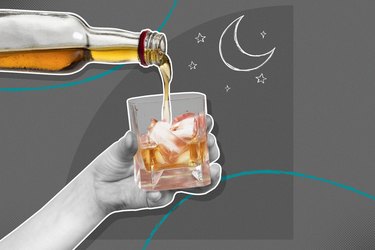
Just the idea that beer and hard liquor have health benefits may seem pretty enticing. But like most good things in life, it's a little complicated.
Tip
If you enjoy a drink, either beer or hard liquor are fine in moderation. But stick to moderate drinking if you want the health benefits of both, and discuss it with your doctor.
Video of the Day
Beer vs. Liquor
Beer contains phenolic compounds, or antioxidants. In beer, the antioxidants originate mostly from barley malt, with the rest contributed by hops.
Video of the Day
But most liquor, beer, spirits and wine contain ethanol. It's this form of alcohol that provides most of the health benefits from alcoholic beverages, as long as you're drinking in moderation, per the Harvard T.H. Chan School of Public Health. Other than small differences, beer and hard liquor provide about the same health benefits, so it's not really about beer vs. liquor or vodka vs. beer.
One advantage of hard liquor, or distilled liquor, is that many spirits have zero carbohydrates. Vodka, rum, whiskey, gin and tequila in their pure form have no carbohydrates, which is beneficial if you're trying to keep your blood sugar from spiking.
Any hard liquor when combined with a sugary mixer — like juice or soda — takes on more calories and carbohydrates.
Moderation Is Key
It should be emphasized that moderation is the key to any health benefits from alcohol use.
A an older, but oft-cited study of 38,000 men over 12 years observed that moderate drinkers were 35 percent less likely to have a heart attack than nondrinkers, per January 2003 research in the New England Journal of Medicine.
The observation was held for beer, hard liquor and wine, and for those who drank alcohol with a meal or without a meal. Interestingly, men who drank light to moderate amounts three or more days a week were less likely to have a heart attack than men who drank once or twice a week.
And a September 2016 study in the American Journal of Public Health showed that women who drank one drink per day over four days were observed to have a lower risk of mortality than those who drank that same amount in one or two days. Any kind of alcohol — beer, hard liquor or wine — was linked to lower heart disease risk, but a higher risk of breast cancer.
What's Considered a Serving?
One beer is considered to be a 12-ounce beer, with 5 percent alcohol content, per the Centers for Disease Control and Prevention. One serving of hard liquor is a 1.5-ounce glass of 80-proof liquor. Moderate alcohol use for most adults is no more than one drink a day for people assigned female at birth and no more than two drinks a day for people assigned male at birth.
The Drawbacks of Alcohol
Alcohol isn't a panacea for good health. Alcohol use, particularly excessive alcohol use, is associated with breast cancer and cancers of the liver, esophagus, colon, rectum and larynx, per the American Cancer Society.
According to the Mayo Clinic, alcoholic beverages can be unhealthy for certain groups of people, including:
- those who are pregnant or trying to become pregnant
- those with a weak heart
- those with a family history of alcoholism
- those with liver or pancreatic disease
- those who have had a stroke
- those who take medicine that interacts with alcohol
Liver cells die every time you drink alcohol. While the liver can regenerate itself and make new cells, drinking too much too frequently can cause permanent damage, aka alcohol-related liver disease, which means your liver won't be able to do its job properly, per the National Health Service.
Symptoms of alcohol-related liver disease include the following, among others:
- swelling of the abdomen, legs, ankles and feet
- fever and shivering attacks
- very itchy skin
- hair loss
- curved fingertips and nails
- blotchy red palms
- weakness and muscle wasting
- confusion and memory problems
- insomnia
- personality changes
Often, people don't know they have alcohol-related liver disease until their liver is badly damaged, per the NHS.
- Centers for Disease Control and Prevention: Alcohol and Public Health
- American Journal of Public Health: Key Findings on Alcohol Consumption and a Variety of Health Outcomes From the Nurses’ Health Study
- Healthline: Alcohol and Health: The Good, the Bad and the Ugly
- Healthline: Vodka: Calories, Carbs and Nutrition Facts
- Mayo Clinic: Alcohol: Weighing Risks and Potential Benefits
- American Cancer Society: Alcohol Use and Cancer
- Harvard T.H. Chan School of Public Health: Is Wine Fine, or Beer Better?
- Fortune: Is Moderate Drinking Good for Your Health? The Science Is Confusing
- National Cancer Institute: Antioxidants and Cancer Prevention


